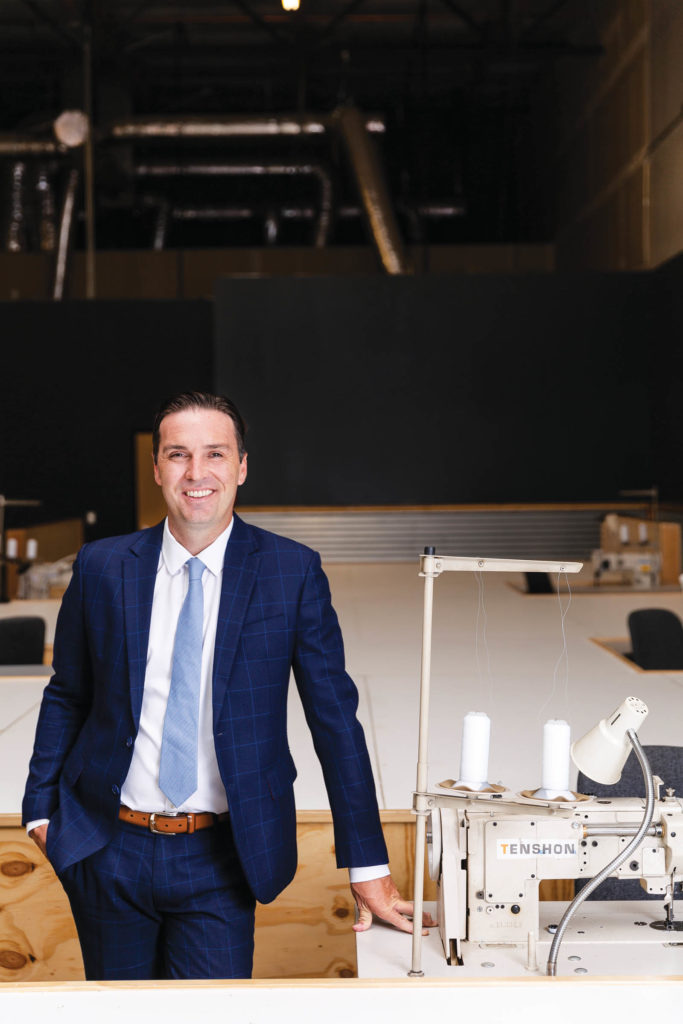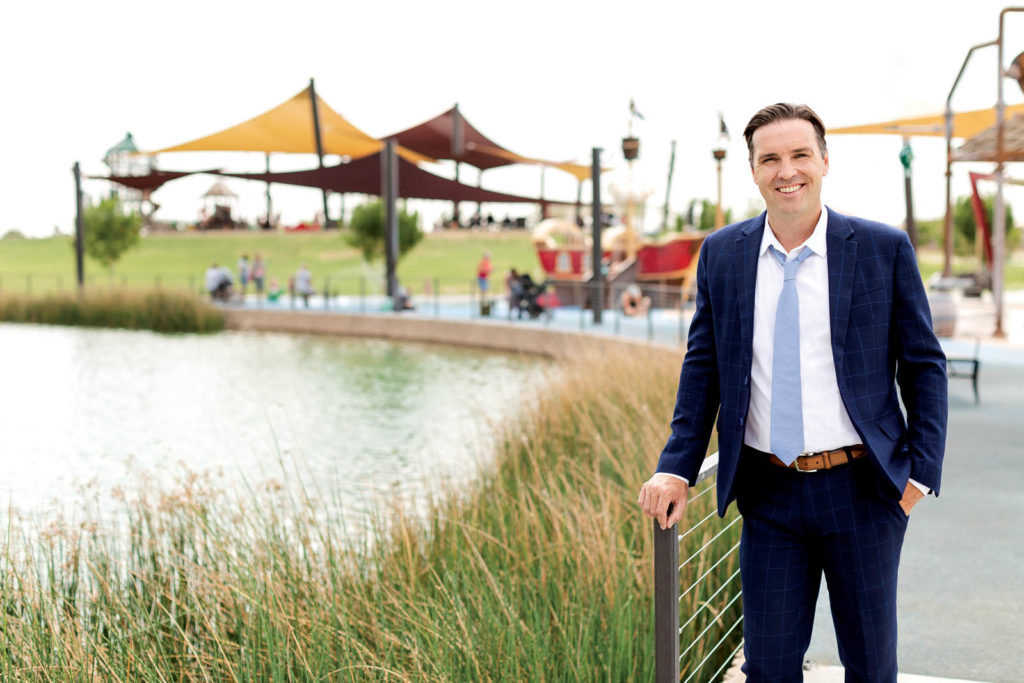
Matthew Dickerson took a chance on shade sails and succeeded—by welcoming failure and hard work while chasing goals.
by Holly Eamon
A 6-by-4-inch yellow paint chip sits in a shadow box on the office wall of Matthew Dickerson, president and CEO of Tenshon, a shade sail manufacturer in Mesa, Ariz. More than a conversation starter, it symbolizes one of the most profound moments—and failures—of Dickerson’s career.
Low on funds and barely two years into getting the company off the ground, Dickerson took on a project that required him to deliver a truckload of steel components from Phoenix to Las Vegas. A quarter of a mile from his destination (and a desperately needed paycheck), Dickerson was cut off in traffic. He veered into a light pole, shearing the truck’s tie-down straps and dumping 18,000 pounds of steel into rush-hour traffic across a busy intersection. The client helped transport the products the rest of the way and followed through on payment, but Dickerson will never forget feeling like that was the end.
Later on, his business partner at the time presented him with a paint chip from the pole he hit. “I look at it every time something goes wrong and remember I got through that challenge and will get through the next one,” Dickerson says. “I’ve learned to accept that you are going to fail—sometimes marvelously—but you have to keep pushing forward.”
Open to opportunity
The possibility of failure has long been embraced by Dickerson. In line with family tradition, he attended law school and even worked for a federal judge after graduating, but business was always his passion. He owned an internet company as an undergrad, followed by an import/export business after law school, but it was eventually halted by the Great Recession. The search for his next endeavor led to lunch with a friend, who introduced him to an opportunity in the shade sail industry. With nothing to lose, Dickerson was all in.
“After spending a couple of months helping my friend in his then-current business, I bought a sewing machine on Craigslist and spent several months in a garage learning everything I could about the industry,” Dickerson recalls. Despite concern from family members, he co-founded Tenshon in 2008. “It’s so cliché to say, but I believe deeply in what can be achieved through hard work,” he says. “You can do amazing things if you put your mind to something and you’re not afraid to fail.”
Four years ago, Dickerson bought out his partner and became the sole owner. Using high-density polyethylene (HDPE), Tenshon creates standard and customized shade sails for residential and commercial clients across the globe. Efficiency has been key to the company’s success and top of mind for Dickerson since the beginning. “As we grew from doing 12 or 15 sales a year to over 1,000, I made sure to create efficiencies that would allow our patterns and processes to be scaled as we acquired knowledge, equipment and customers.”
This is also part of the reason Dickerson earned several manufacturing certifications early on. These skills help him not only innovate but also better understand the industry and his employees. “We’re a small but nimble team,” he says. “Welders and sewers understand installation and packaging … project managers have been to installs. We do everything in-house to deliver the highest quality product possible. I want to be proud of what we do, and I want our employees and clients to be proud as well.”
Setting priorities
Consistency is not as easily found outside of the business. “My biggest frustration with this market is it’s hard to predict; the commercial industry, especially, is a moving target,” Dickerson says. “Because the life cycle of our product can vary, when we complete a project for a resort or an institution, we can’t depend on them for anything except an occasional replacement. We have to do really good work for really good people and hope referrals will support our ongoing relationship-building and marketing efforts.”
Residential projects, which comprise roughly 15 percent of Tenshon’s sales, are slightly more predictable and typically grow year over year. Sales received an extra boost in 2020 as home improvement projects increased because of the COVID-19 pandemic. To preserve time and resources for large, custom projects while continuing to meet residential demand, Dickerson recently expanded the company’s standard offerings. “We’ve learned that at a certain price point, it’s better to offer a wide selection of standard solutions that will work for most everyone rather than overextend ourselves trying to customize every single project.”
To differentiate his team’s expertise and products, Dickerson has also learned the importance of maintaining a strong online presence. “I’ve spent a lot of time building a comprehensive company website, developing high-quality instructional videos, and managing analytics, keywords and social media.”
Growing together
Thanks to his membership in Industrial Fabrics Association International (IFAI), Dickerson has shared many of his learnings with peers and applied lessons from their mistakes and victories to his business. “I often feel alone in a vacuum, but building relationships through IFAI has allowed a lot of walls to come down so I can collaborate with people who otherwise may be my competition,” he says. “It’s inspiring to see what others are doing and have a community that’s actively working to further our entire industry.”
Educating those less familiar with the industry is equally, if not more, important to Dickerson. Many of the videos he creates are in response to common client questions. “Customers by and large don’t know what shade sails are. They don’t fully grasp how these products function and what their purposes really are.” Dickerson recalls turning away a prospective walk-in customer after explaining that the shade the person desired would be better achieved by planting trees. “I want people’s projects to work, whether they buy my product or not. I get pictures all the time from customers who have installed one of our standard products incorrectly, and while I’m happy they’re using my product, I wish it was being used the right way. It’s an uphill battle.”
Dickerson is working to better engage and inform the architecture industry as well, from teaching guest lectures at universities to funding a design challenge scholarship. Tenshon offers the scholarship twice a year to students interested in architecture, design or engineering. Applicants must use the company’s standard-sized sails to create a unique shade sail structure, and winners are chosen based on creativity, buildability, practicality and applicability.
“Helping people understand how fabric works at a young age is so important and key to growing the industry,” Dickerson says. “We can’t produce great results when we’re added to a project at the last minute; we need more architects and designers who know to include us from the beginning so we can more appropriately apply what we do to the greater design and construction world.”
Undeterred by these challenges, Dickerson couldn’t be happier to have fallen into—and risen through—the shade sail industry. “So much of business can be mundane, but what I love about this industry is that I get to create amazing works of construction that not only look really great but also provide a really valuable service. To have had a part in so many remarkable projects across the world from my small shop in Arizona never ceases to amaze me. And it never would have happened if I hadn’t taken a chance with a sewing machine in a garage.”
Holly Eamon is a business writer and editor based in Minneapolis, Minn.
SIDEBAR: Q&A

How do you maintain authentic relationships with employees?
First, I share this analogy with all new hires: You can work for two types of companies. One is a tour bus, and one is a Ferrari. If you want a predictable, safe ride, you can hop on the back of the tour bus; it makes occasional stops and as people slowly get off, you can start to move up. In a Ferrari, you will make sharp turns and stop at roadside attractions on a whim, but you also may wrap it around a tree. Neither journey is wrong; it just depends on how you’re wired.
I’m in a Ferrari, and I want them to keep that in mind. I’m transparent about the high expectations I set for employees—and myself—in pursuing perfection, as well as the important fact that I care about their lives outside of business. The pursuit of knowledge and growth are at the core of who I am, and I want that for my employees in all aspects of their lives.
SIDEBAR: Project Snapshot

Shading CocoCay
No stranger to taking chances, Matthew Dickerson, president and CEO of shade sail manufacturer Tenshon, accepted a challenge in May 2018 that now serves as one of the most striking examples of the high-quality work his team is primed to produce: shading Royal Caribbean’s entire private island, Perfect Day® at CocoCay®.
With a soft open scheduled for April 2019, Dickerson spent eight months discussing design modifications, fabric recommendations and installation processes with the client. And right on time, he and his team manufactured and delivered approximately 250 poles and components ranging from 10 to 20 feet tall, with more than 150 individual shade sails ranging from 400 to 4,500 square feet of a custom-blue HDPE fabric.
“This unique setup is right in our wheelhouse, and my staff did an amazing job with organization and logistics,” Dickerson says. “It was also a perfect example of how addressing shade sails late in the game can lead to a need for changes or adjustments after the fact.” Because not all of Dickerson’s design recommendations were approved, he’s already been asked to amend and redesign several areas and replace several sails. Still, he says, “I continue to be blown away by the incredible opportunity; it turned out awesome.”
 TEXTILES.ORG
TEXTILES.ORG


